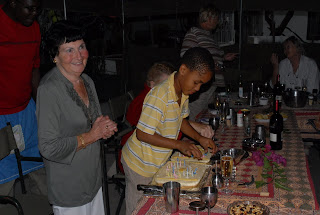Last week we had a nice trip up to Moremi, Savute and Chobe Game Reserves that is until the wicked intestinal malaise hit. Unfortunately, there’s something going around Maun. Paul got it first, then he shared it with me (what a nice anniversary gift!). All I ate in three days was a piece of bread and some chicken broth. So I won’t focus on the last few days of the trip but to say that I have a heck of a story for my friend Kirby (who collects stories like this). Not pretty. Enough said.
The first part of the trip, however, was quite fun and Paul and I enjoyed a couple of nights of decadence including free accommodation and dinner in exchange for a his star shows. We rather enjoy the barter system. Thursday night we stayed at Mogothlo tented camp (http://www.mankwe.com/mogothlo.htm). This modest tented camp situated on the way to Savute has comfortable tents, newly renovated bathrooms and nice big decks for sundowners. We had several visitors during the night – all creatures great and small! The “great” creatures were the elephants that munched on camel thorn seed pods right near our tent all night long (mogothlo means camel thorn, hence the name of the camp). One of the things I enjoy most about Botswana is the experience of not quite knowing what I’m hearing. I woke to sounds that reminded me of someone vigorously shaking a newspaper over and over again. What it turned out to be was elephants right by our tent going through the brush. They had quite a feast and made quite a racket. We also heard hippo, hyena, and a lion pride fairly close to where we slept. Exciting stuff!
The “small” creature I didn’t learn about until the next day when I unpacked my bag and noticed that the jacket cover on the book I had been reading for my Sociology of Gender class had been chewed to smithereens. Fortunately, he wasn’t still in the bag. Do you think I can tell my students that a mouse ate my homework?
 |
| View from our tent at the Savute Elephant Camp |
Friday during the day we drove around scouting out new campsite for the mobile safari sector (the government allots certain sites for the industry and we were trying to find new ones). That night we stayed at Savute Elephant Camp where Paul did another star show (http://www.savuteelephantcamp.com/web/osec/savute_elephant_camp.jsp). This was the real decadence where room prices run $1065/person/night this time of year! Yikes! I’d say that was a well compensated star show!
This amazingly beautiful lodge is situated on the Savute channel (as I mentioned before, the channel has water in it for the first time since the early 1980s). This place is really top notch – food was excellent, service was first rate (we were greeted by several staff on our arrival and escorted to our tent), accommodations stunning! Our “tent” overlooked the channel (and I put that word in quotes because it had heat/AC, an amazing outdoor shower with a view… in fact, our “tent” was much nicer than the “house” we live in!). The bar/lounge/eating area is right next to the in-the-ground swimming pool.
 | |
| Dining/Lounge area at Savute Elephant Camp |
 | |
| Double outdoor shower, Savute Elephant Camp |
Fortunately, we both were feeling pretty good that night and very much enjoyed the three course meal – tomato herb soup, bream with steamed vegetables and mash potatoes, and a dessert of baked apple in a puffed pastry shell with caramel sauce – yum! Paul gave a stunning star show with breath taking views of the crescent moon, the rings of Saturn and a whole array of other celestial objects from the birth place of stars to the grave yard of stars. The guests seemed to really enjoy it (except for the group from the States who had recently arrived in country on their “private jet” and were too tired to stay up for the show! Talk about decadence!).
Saturday night we stayed just around the corner (on the wrong side of the tracks??) in the “public” campsite (now actually privately owned). It was funny to think about the electric fenced fortress surrounding Savute Elephant Camp in contrast to the open public campsite. Are their lives really more valuable than ours? Maybe wildlife prefer the taste of money?
Saturday we made our way up to the Chobe National Park through the forest reserve (rescuing a group of people stuck in the deep sand along the way who announced they were “sitting fast” in broken English indicating they were stuck). As always, we were not disappointed with the abundance of animals on the Chobe riverfront (I think this is one of the best places for game viewing in Botswana if not THE best). We saw kudu, zebras, giraffe, and a few large herds of elephants.
From there our health went downhill. Paul acquired a nasty head cold in addition to the gastrointestinal malaise. We stayed at a small lodge outside of Kasane (really needed indoor plumbing!) and Paul marketed his many business ventures (maps, print house – for copying, binding, laminating, and the safari company). I tried to remain awake and vertical and completed a nice tour of the toilets of Kasane. Maybe I should write a review of those…
Fortunately, we’re (mostly) back to feeling better. I’m back eating solid food (Paul never stopped) but he still has a head cold I’ve somehow managed not to get. The other day I received the official notification of the schedule for a start of the school year. A little less than a month from now I’ll be sitting in a two-day faculty retreat. Such is my life on two continents!
















